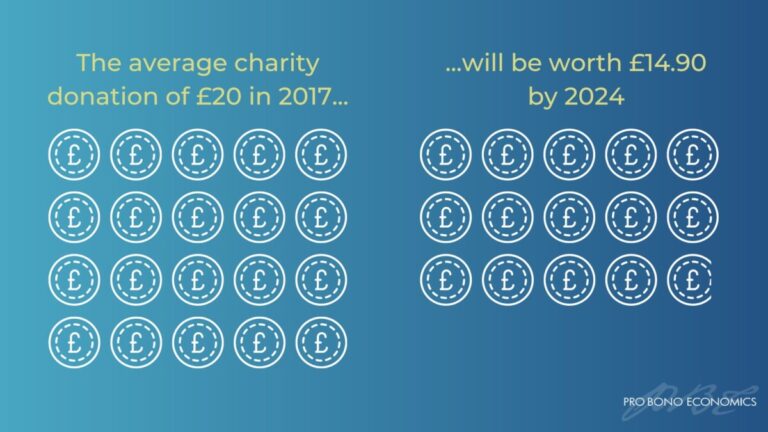Inflation: Average £20 donation will be worth less than £15 by 2024

Inflation means the £5.7 billion in donations given to charities in the first six months of this year will be worth £500 million (8.5%) less by the end of the year. The average £20 donation will also be worth under £15 in 2024, according to analysis by Pro Bono Economics (PBE) and the Charities Aid Foundation (CAF).
Using the Bank of England’s latest inflation forecasts PBE projects that a £20 direct debit set up in 2017 (the average given over the past five years) will be worth £15.30 next year, and £14.90 by 2024.
Staff costs, funding & contracts
The analysis, The cost of giving: What UK charities need to know about inflation, also found that if charity sector staff costs were to keep up with inflation, the sector would need to find an additional £3.8bn by 2023 and £6.1bn by 2024, compared to 2018/19.
Advertisement
Rising staff costs will be one of the major ways in which inflation affects charities’ expenditure. According to the NCVO Almanac, the sector spends over 40p in every £1 on staffing costs.
Grant funding and contracts will also be affected. A three-year £100,000 grant or contract awarded in 2022 will be worth £90,660 in 2023 and £88,300 in 2024 according to current Bank of England forecasts.
Impact on reserves
In terms of charity reserves, PBE and CAF’s analysis found that medium-sized charities (with income between £500,000 and £1m) had on average 4.2 months of expenditure held in reserves as cash prior to the pandemic. However, by 2023 those reserves would cover just 3.5 months of activity if expenditure by those charities rises in line with inflation. This means a typical charity with an income of £1mn in 2021 would need to increase its reserves by £73,430 by next year to ensure the 2021 value of reserves did not fall by 2023 due to inflation.
Similarly, large charities (with income between £1m and £10m) had on average 3.78 months of expenditure held in reserves as cash prior to the pandemic. But by 2023, those reserves would cover just 3.1 months of activity if expenditure by those charities rises in line with inflation. This means that a typical charity with an income of £5m in 2021 would need to increase its reserves by £329,650 by 2023 to make up that gap.
Matt Whittaker, CEO of Pro Bono Economics, said:
“Having stepped up to help the nation through the unprecedented challenges posed by the pandemic, charities are now having to deal with 40-year high inflation and the repercussions of the cost of living crisis.
“Donations, grants and reserves are all stretching less far than was previously the case, even as the nation’s demand for charitable support soars.
“It matters in the near term, and in the long term too. The social sector provides indispensable support during times of crisis, but it is precisely during these periods that the financial resilience of charities and community groups is most tested.
“There is no quick fix, but with a new government in place it is important Ministers renew and strengthen their relations with a sector that has such a vital role to play in helping the nation navigate today’s cost of living storm.”
Neil Heslop, CEO of Charities Aid Foundation, commented:
“This new analysis reveals that inflation will wipe off half a billion pounds of hard-earned money already given to charities during the first half of the year. Inflation is eroding the value of donations and reserves in real terms.
“Despite falling donations, charities are working hard to help the growing number of families at the sharp end of the cost of living squeeze. Ultimately, charities are having to do much more, with much less money.
“Many organisations were unable to rebuild their reserves before this current crisis took hold. As a result, a third of charities are worried about their very survival, threatening the vital services that communities need over the coming months.”
Today’s announcement of a slightly lower than anticipated inflation rate of 9.9% will make little difference to charities.
Faye Jones, fundraising manager at Shepton Mallet-based animal charity Happy Landings Animal Rescue said:
“The pressure on people’s finances amid the cost of living crisis is proving immense and charities around the UK are all experiencing the knock-on effect of this. Donations are going off a cliff as people batten down the hatches. In recent months, the number of donations we’ve received online has more than halved and even with the new energy price cap things are looking exceptionally bleak. We’re also seeing more animals being handed over, as people cannot afford to feed their pets.”



